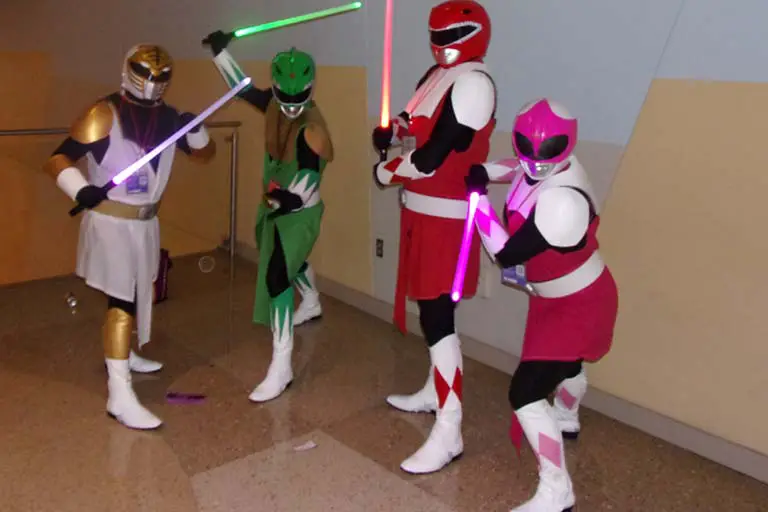It's widely known that the world of cosplay has proliferated around the globe. But have you considered that Japan's cosplay scene is encapsulated by its unique set of laws? Within this blog, we'll demystify the legal labyrinth cosplayers need to navigate in Japan, providing tips on how to stay on the right side of the law whilst still enjoying the pastime. This topic has grown in popularity so much we’ve crafted a comprehensive beginner’s guide to cosplaying in Japan, perfect for initiating you into the marvellous world of Japanese cosplay.
The Art of Cosplaying
Cosplay, short for costume play, is a performance art that involves dressing up as a character from a book, movie, anime, or video game. It is an activity that has gained popularity worldwide and is particularly well-known in Japan.
In cosplay events, participants dress up and act like their favorite characters. The art of cosplaying began in Japan in the 1970s as fans started to dress up as characters from popular manga and anime series.
Since then, the practice has grown into a global phenomenon with fan conventions and cosplay contests being held around the world. In Japan alone, cosplay has become an important aspect of popular culture with thousands of enthusiasts participating annually.
Understanding the Popularity of Cosplay in Japan
Japan is known for its love for pop culture ranging from anime and manga to video games and cosplay. The country has created some of the most famous cartoons and comics that have gained worldwide recognition.
Japanese animation (anime) has influenced many aspects of youth culture globally; therefore, it’s no wonder that cosplay also took hold here. Cosplay events are held across Japan throughout the year to celebrate various pop culture phenomena such as anime or comic books.
Events like Comiket (Comic Market) held twice a year gather over half a million attendees who participate in cosplaying as well as buying doujinshi (fan-made comics). It comes with no surprise that these events attract massive crowds due to their unique atmosphere that offers fans an opportunity to interact with others who share similar interests.

The Importance of Understanding Legalities
While cosplaying may seem like just another form of dressing up or playing make-believe – however – there are serious legal considerations when it comes to its practice in public spaces. There are several laws governing what can and cannot be done while cosplaying in Japan, and it is essential to understand them to avoid violating them. The use of copyrighted materials in cosplay presents potential legal issues as characters’ costumes and designs are often trademarked.
The law of public nuisance poses another legal minefield that cosplayers must navigate; it forbids actions that might stir up trouble in public spheres. As such, appreciating the legalities of cosplaying becomes crucial in side-stepping any potential legal pitfalls. For instance, cosplay involving realistic weapon replicas may draw attention or wearing extravagant costumes in non-designated areas might be interpreted as a public nuisance.
Overview of Japanese Laws and Regulations on Cosplay
Japan is recognised globally as a premier destination for cosplay enthusiasts. The practice is woven into the fabric of Japanese culture, with numerous events scattered throughout the annum. Notable events include the Comiket - the world's largest fan convention held biannually in Tokyo, and the World Cosplay Summit - an international cosplay event held in Nagoya.
However, despite its popularity, there are certain legalities surrounding cosplay that individuals need to be aware of. Japanese laws and regulations with regards to cosplay are primarily related to two areas: copyright law and public nuisance law.
Copyright law deals with the protection of intellectual property rights while public nuisance law relates to public order and safety concerns. It’s important for cosplayers to understand these laws as violating them can result in fines or even legal action.

Copyright Law
Copyright law protects original works from being copied or used without permission. In Japan, this includes literary works, artworks, and other creative works such as character designs. When it comes to cosplay, one may wonder if using copyrighted materials in their costume is allowed.
Regarding copyrighted material, its use in cosplay isn't necessarily illegal, however, limitations are placed on the extent of usage without explicit permission. For instance, if a cosplayer excessively uses copyrighted material without consent, or sells merchandise featuring such materials, they might face legal repercussions from the rights owner.
Protection of Intellectual Property Rights
It’s important for cosplayers to respect intellectual property rights when creating costumes or props based on characters from anime/manga/games/movies etc. While some companies allow certain uses of their characters for personal use or non-commercial purposes only but others take a more strict approach. Not only selling copies but also sharing digital files (such as 3D printing models) can violate copyright laws if done without proper permission.
Public Nuisance Law
The Public Nuisance Law regulates activities that cause disturbance or inconvenience to quality-of-life aspects within society such as noise pollution or traffic jams. Cosplayers are not exempt from these laws, and they must conduct themselves responsibly in public places.
For example, if a cosplayer is obstructing traffic, causing disturbances or behaving inappropriately during a public event, it may be considered as violating the Public Nuisance Law. In such cases, the cosplayer can be fined or even arrested by law enforcement authorities.
How it relates to cosplay
In order to avoid legal issues with cosplay in Japan, it’s important to respect the intellectual property rights of others and abide by the Public Nuisance Law. Cosplayers should not use copyrighted materials without permission and should conduct themselves appropriately while in public spaces. By being aware of these legalities surrounding cosplay culture in Japan and following appropriate guidelines cosplayers can safely enjoy this popular hobby without facing any legal issues.
Copyright Law and Cosplay in Japan
Overview of copyright law in Japan
Copyright law in Japan is governed by the Copyright Act, which protects original works of authors, composers and creators. This includes literary, artistic, musical, cinematographic and photographic works.
The rights to these works are owned by the creator or their designated party who has registered the work with the Japanese Intellectual Property Office (JIPO). In contrast to other countries where ownership is granted automatically upon creation.
Protection for creators and owners
In Japan, copyright protection lasts for 50 years beyond the life of the creator. Ownership rights can be transferred or sold but only through a written agreement. If someone infringes on a creator’s copyright in Japan, they can be fined up to 10 million yen or face imprisonment for up to three years.
Limitations on use for non-commercial purposes
The Copyright Act provides some limitations on use for non-commercial purposes such as education, research or private use. However, the exact scope of these limitations is not clearly defined and can vary based on individual cases.
Use of copyrighted materials in cosplay
Cosplayers often use copyrighted materials such as characters from anime or video games as their costumes or props. While this may be permissible under certain circumstances such as parody or fair-use doctrine in some countries like the US. In Japan’s legal system it’s less clear cut making it difficult to navigate without running afoul of their strict intellectual property laws.
Legal implications for using copyrighted material without permission
If cosplayers use copyrighted material without permission they risk violating copyright laws which could lead to fines and even imprisonment depending on severity. However it should be noted that legal actions against cosplayers due to infringing upon copyrights are relatively rare due to difficulties proving damages.
How to obtain permission for use
One of the best ways to obtain permission is through licensing agreements, which grant cosplayers permission to use copyrighted material in exchange for a fee or royalty payment. These agreements are often made between the creator or owner of the material and a third-party licensing agency. However, smaller-scale cosplays may not have the means to foot these costs.
Alternatively, some creators may allow their work to be used as long as credit is given and it’s purely non-profit in nature. Regardless, obtaining permission is always recommended to avoid legal issues down the line.
Public Nuisance Law and Cosplay in Japan
Definition and Scope
Public nuisance refers to any behavior or act that is considered offensive, dangerous, or disruptive to the public. In Japan, this includes a wide range of activities such as loud noises, public intoxication, and indecent exposure. The law is designed to promote public safety and protect individuals from unreasonable interference.
What Constitutes a Public Nuisance?
For cosplayers, public nuisance can be defined as any act that generates complaints from the public or interferes with their daily lives. This may include wearing costumes that are too revealing or disturbing, blocking traffic in crowded areas while taking photos, or creating excessive noise or disturbance in residential areas.
Implications for Cosplayers
Cosplayers who violate public nuisance laws may face penalties such as fines or even arrest. Being charged with a crime can also negatively impact their reputation and future cosplay opportunities. It is important for cosplayers to be aware of these laws and take steps to avoid violating them.
Possible Penalties or Fines
The penalties for violating public nuisance laws vary depending on the severity of the offense. Minor offenses may result in warnings or small fines, while more serious violations could lead to arrest and imprisonment. Cosplayers should be aware of potential legal consequences before engaging in cosplay activities.
How to Avoid Violating Public Nuisance Laws
To stay within the bounds of public nuisance laws while cosplaying in Japan, it's imperative for cosplayers to carry an awareness and respect of societal standards and appropriate conduct. This means choosing costumes that don't expose too much skin or induce discomfort, maintaining noise levels to a minimum in residential quarters and respecting personal space when engaging in photographic activities: as much as cosplay is embraced in Japan, cosplayers must remain cognizant of the legal repercussions of their actions.
Violating public nuisance laws can result in penalties and negative consequences, so cosplayers should take steps to avoid these situations whenever possible. By being respectful and mindful of others, cosplayers can continue to enjoy their hobby without running afoul of the law.
Conclusion
Importance of Understanding the Legalities of Cosplay
It is essential to understand the legalities surrounding cosplay before engaging in it in Japan. While cosplay is widely accepted and celebrated in Japan, there are specific laws and regulations that cosplayers must abide by.
Violating these laws can result in significant legal and financial repercussions. Furthermore, understanding the legalities of cosplay can help cosplayers protect their intellectual property rights and avoid infringing on others’ rights.
It also helps cosplayers avoid violating public nuisance laws that could harm themselves or others. By following these laws, cosplayers can enjoy their hobby safely while respecting Japanese culture and society.
In the grand scheme of things, as cosplay ascends in global popularity, it is paramount for enthusiasts to comprehend this form of expression’s legal contours. By doing so, they can ensure that their fervour for cosplay remains a positive pursuit, providing great joy for themselves and fellow enthusiasts. Remember, whilst it's integral to obey the law, the world of cosplay is all about fun and creativity in expressing yourself and celebrating your favourite characters.





